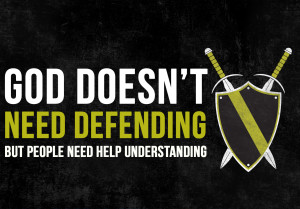 I got a call early this morning informing me about one of our middle school students who was told in class yesterday that the Bible is not a trustworthy source because of the Gilgamesh Epic. I do not have the time or space to go into Gilgamesh today, but you can find some information here. Rather than pontificating on Gilgamesh or on any particular apologetic issue here, I want to lay out a few steps that we can teach our students to help them defend their faith in the classroom, especially in the presence of a pushy teacher.
I got a call early this morning informing me about one of our middle school students who was told in class yesterday that the Bible is not a trustworthy source because of the Gilgamesh Epic. I do not have the time or space to go into Gilgamesh today, but you can find some information here. Rather than pontificating on Gilgamesh or on any particular apologetic issue here, I want to lay out a few steps that we can teach our students to help them defend their faith in the classroom, especially in the presence of a pushy teacher.
- Be respectful. Paul commands the Romans to respect and submit to those who are in authority. In a classroom, the teacher is the authority and she or he should be respected by all students, but especially by Christian students. You may need to ask for time after class to discuss a topic or respond in an email.
- Be in Prayer. Pray for those who are in authority over you. God has you in this situation for a reason, he is on control.
- Set a Reasonable Goal. Greg Koukl encourages his readers to “put a stone in the shoe” of those with whom they share their faith. You probably will not have the opportunity to work through the whole gospel in a classroom apologetic encounter, your goal should be to give your teacher and classmates something to ponder that will begin to chip away at their unbelief.
- Ask Questions. Koukl, mentioned above, advocates for the “Columbo Tactic.” If you were confronted with the teacher who questioned the Genesis flood account, some questions to ask might have been, “Have you read the Gilgamesh Epic?” or “How much study have you put into the book of Genesis?” If you know a little about Gilgamesh, you may ask “How do you feel about the creation account in the Enuma Elish?
- Keep Your Cool. Passion is great, but anger and loud tones of voice in a classroom will do little to propel the gospel and may actually land you in the principal’s office. Put on the Fruit of the Spirit.
- Call in Back-Up. It is OK to say, “I don’t know.” If you are asked a question you can’t answer, acknowledge that you do not have the answer and then go find it. Use the resources at your disposal: parents, pastors, Study Bibles (especially the Apologetics Study Bible), and the internet.
- Know Your Rights. Religious Freedom at Public Schools
- Do Not Be Afraid. The fact that someone does not believe the Bible is not newsworthy. Nevertheless, you have nothing to fear. Another person’s lack of belief does not need to affect your belief. God is not surprised when your faith is challenged, and his faithfulness is not negated because of another’s lack of belief.
Hopefully these 8 steps will be beneficial to you or to your kids as they learn to defend their faith in school.
